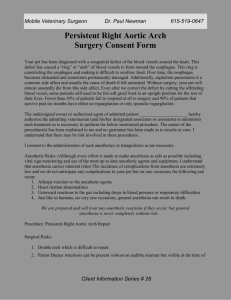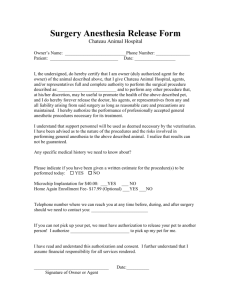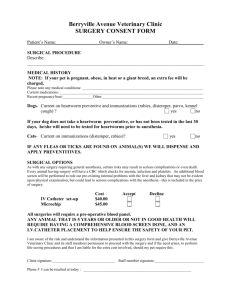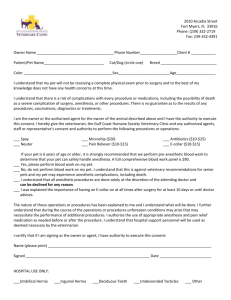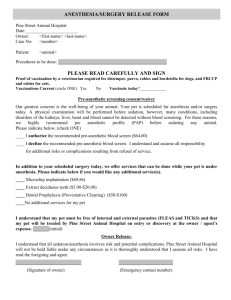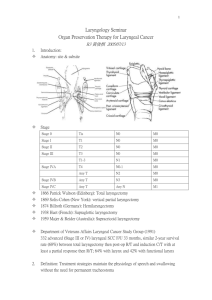Glucose Curve Procedure For Diabetics
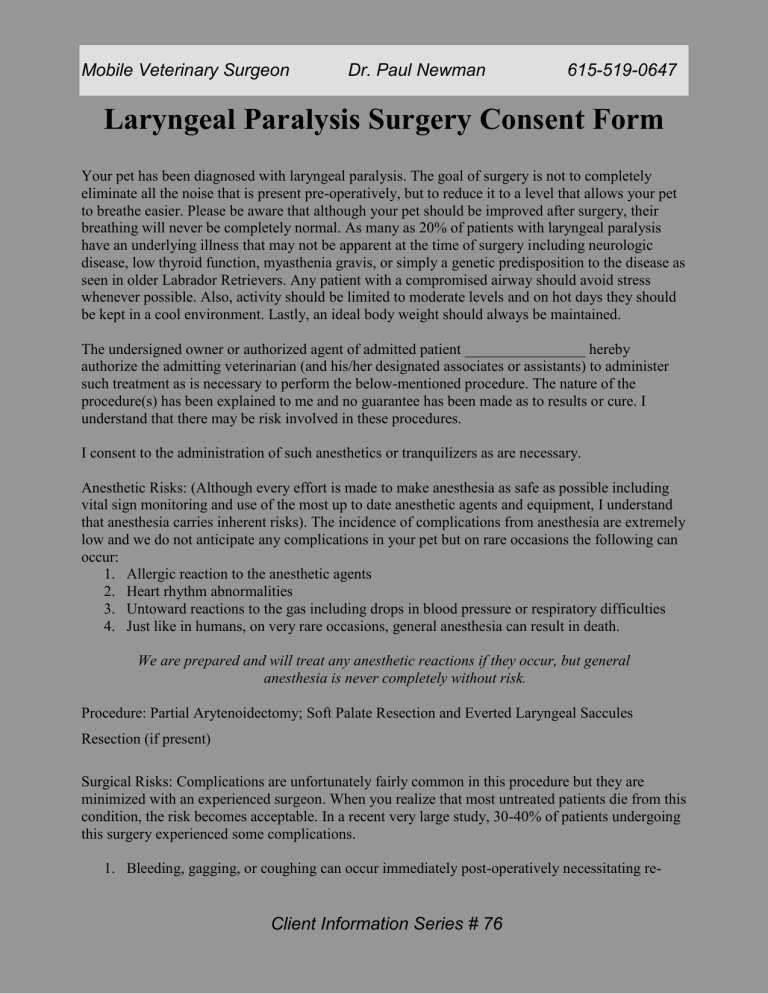
Mobile Veterinary Surgeon Dr. Paul Newman 615-519-0647
Laryngeal Paralysis Surgery Consent Form
Your pet has been diagnosed with laryngeal paralysis. The goal of surgery is not to completely eliminate all the noise that is present pre-operatively, but to reduce it to a level that allows your pet to breathe easier. Please be aware that although your pet should be improved after surgery, their breathing will never be completely normal. As many as 20% of patients with laryngeal paralysis have an underlying illness that may not be apparent at the time of surgery including neurologic disease, low thyroid function, myasthenia gravis, or simply a genetic predisposition to the disease as seen in older Labrador Retrievers. Any patient with a compromised airway should avoid stress whenever possible. Also, activity should be limited to moderate levels and on hot days they should be kept in a cool environment. Lastly, an ideal body weight should always be maintained.
The undersigned owner or authorized agent of admitted patient ________________ hereby authorize the admitting veterinarian (and his/her designated associates or assistants) to administer such treatment as is necessary to perform the below-mentioned procedure. The nature of the procedure(s) has been explained to me and no guarantee has been made as to results or cure. I understand that there may be risk involved in these procedures.
I consent to the administration of such anesthetics or tranquilizers as are necessary.
Anesthetic Risks: (Although every effort is made to make anesthesia as safe as possible including vital sign monitoring and use of the most up to date anesthetic agents and equipment, I understand that anesthesia carries inherent risks). The incidence of complications from anesthesia are extremely low and we do not anticipate any complications in your pet but on rare occasions the following can occur:
1.
Allergic reaction to the anesthetic agents
2.
Heart rhythm abnormalities
3.
Untoward reactions to the gas including drops in blood pressure or respiratory difficulties
4.
Just like in humans, on very rare occasions, general anesthesia can result in death.
We are prepared and will treat any anesthetic reactions if they occur, but general anesthesia is never completely without risk.
Procedure: Partial Arytenoidectomy; Soft Palate Resection and Everted Laryngeal Saccules
Resection (if present)
Surgical Risks: Complications are unfortunately fairly common in this procedure but they are minimized with an experienced surgeon. When you realize that most untreated patients die from this condition, the risk becomes acceptable. In a recent very large study, 30-40% of patients undergoing this surgery experienced some complications.
1.
Bleeding, gagging, or coughing can occur immediately post-operatively necessitating re-
Client Information Series # 76
Mobile Veterinary Surgeon Dr. Paul Newman 615-519-0647
anesthetizing your pet and temporary intubation. We treat all these patients with short acting steroids to reduce any swelling but on rare occasions this can still occur. In very rare instances, patients may need a temporary tracheotomy for a few days until the swelling resolves.
2.
Aspiration pneumonia is a very common complication of this surgery. As many as 20% of patients can develop pneumonia within the first six months of surgery.
3.
Since taking too much tissue results in pneumonia, we always take the least amount necessary to create a working airway. If not enough tissue is resected initially, a second surgery may be required to remove more tissue at a reduced cost. It is imperative to be conservative in this regard as removing too much tissue can lead to death. It is far simpler to go back a take a little more tissue than to take too much since we can not undo this mistake.
Experienced surgeons rarely need to do a second procedure.
4.
Continued respiratory distress if scar tissue forms or not enough tissue is taken initially.
5.
Acute death occurs in very rare instances, mostly when there are other underlying diseases like thyroid deficiency, pre-existing pneumonia, or neurologic disease. Long term death usually results from aspiration pneumonia.
______________________________________________________________________________
Date Pet Owner/Agent Signature Phone I Can Be Reached At Today
